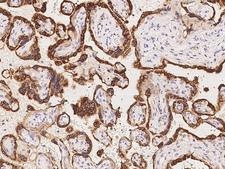order histories, retained contact details for faster checkout, review submissions, and special promotions.
Forgot password?
order histories, retained contact details for faster checkout, review submissions, and special promotions.
Locations
Orders Processing,
Shipping & Receiving,
Warehouse
2 Shaker Rd Suites
B001/B101
Shirley, MA 01464
Production Lab
Floor 6, Suite 620
20700 44th Avenue W
Lynnwood, WA 98036
Telephone Numbers
Tel: +1 (206) 374-1102
Fax: +1 (206) 577-4565
Contact Us
Additional Contact Details
order histories, retained contact details for faster checkout, review submissions, and special promotions.
Forgot password?
order histories, retained contact details for faster checkout, review submissions, and special promotions.
PSG4
pregnancy specific beta-1-glycoprotein 4
The human pregnancy-specific glycoproteins (PSGs) are a family of proteins that are synthesized in large amounts by placental trophoblasts and released into the maternal circulation during pregnancy. Molecular cloning and analysis of several PSG genes has indicated that the PSGs form a subgroup of the carcinoembryonic antigen (CEA) gene family, which belongs to the immunoglobulin superfamily of genes. Members of the CEA family consist of a single N domain, with structural similarity to the immunoglobulin variable domains, followed by a variable number of immunoglobulin constant-like A and/or B domains. Most PSGs have an arg-gly-asp (RGD) motif, which has been shown to function as an adhesion recognition signal for several integrins, in the N-terminal domain (summary by Teglund et al., 1994 [PubMed 7851896]). For additional general information about the PSG gene family, see PSG1 (MIM 176390).[supplied by OMIM, Oct 2009]
| Gene Name: | pregnancy specific beta-1-glycoprotein 4 |
| Family/Subfamily: | CEA , not assigned-CEA |
| Synonyms: | PSG4, PS-beta-G-4, PSBG-9, PS-beta-G-9, CGM4, PSBG-4 |
| Target Sequences: | NM_002780 NP_002771.2 Q00888 |


If you do not find the reagent or information you require, please contact Customer.Support@LSBio.com to inquire about additional products in development.









